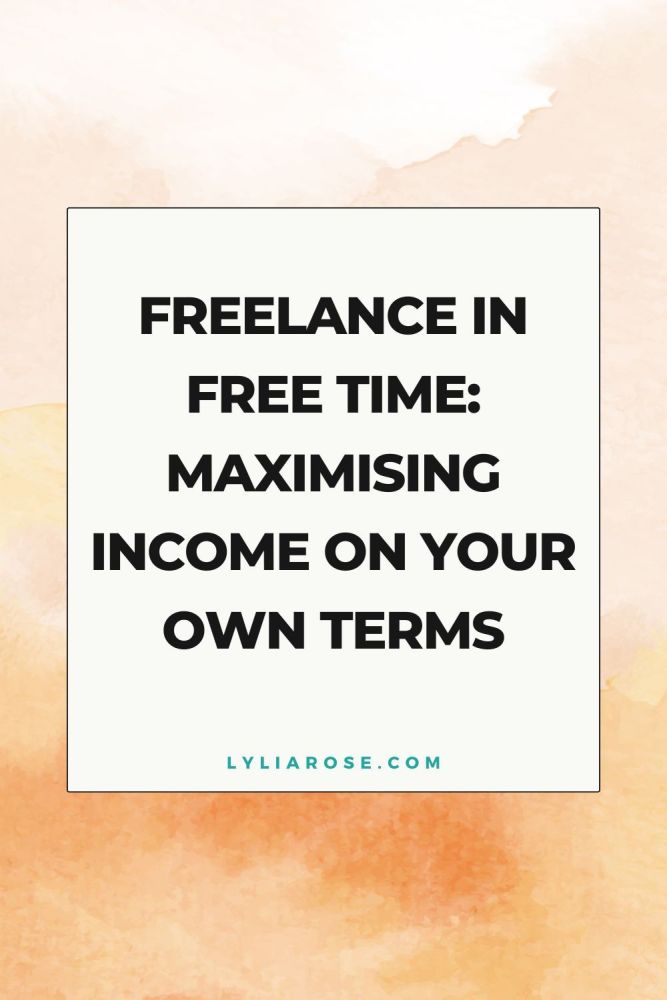Freelance in Free Time: Maximising Income on Your Own Terms
Posted on
Many of us want to earn a little extra without giving up all our spare time. Whether it's to help with rising bills, save for a holiday, or gain more control over our working life, freelancing offers a flexible way to top up your income.
If you’ve ever wondered how to make money in your free time—without committing to a second full-time job—freelancing could be the answer. It gives you the chance to use your existing skills, work on your own terms, and build something meaningful alongside your regular commitments.
In this guide, you’ll discover how to start freelancing in the UK, what kind of freelance jobs work best in your spare time, and how to manage your time effectively for maximum freelance success.

Why freelancing is worth considering
Freelancing gives you the freedom to work when and how you want. It’s ideal for people with unpredictable schedules, family responsibilities, or those who prefer to work independently.
Instead of committing to a regular part-time job, you can choose freelance projects that fit around your lifestyle. This flexibility makes it one of the most practical ways to earn extra money in your spare time.
Benefits of freelancing include:
-
Setting your own hours
-
Working from home or anywhere with Wi-Fi
-
Choosing projects that suit your interests
-
Earning additional income without changing jobs
-
Building valuable skills and experience
Whether you’re a student, parent, or someone juggling a busy schedule, freelancing can help you make the most of your free time.
Best freelance jobs to do from home
There are many freelance roles that require little more than a computer and a reliable internet connection. These jobs are ideal for evenings, weekends, or whenever you have a few spare hours.
Popular freelance jobs to do from home in the UK include:
-
Writing and blogging – Ideal for those who enjoy creating content for websites, blogs or marketing
-
Virtual assistant work – Manage inboxes, scheduling, research, or admin tasks for businesses
-
Proofreading and editing – Perfect if you’re detail-oriented with strong grammar skills
-
Graphic design – Create logos, social media graphics or visual branding
-
Social media support – Help small businesses plan and schedule their posts
-
Transcription work – Convert audio recordings into written documents
-
Online tutoring – Teach academic subjects or English as a second language
These roles suit beginners and often don’t require formal qualifications. Many offer flexible deadlines and pay per project or hour.
How to start freelancing in the UK
If you're just getting started, freelancing might feel unfamiliar—but it’s straightforward once you know the steps.
-
Choose a service to offer
Start with something you’re already good at, such as writing, admin, or customer service. -
Pick a niche
A focused freelance niche makes you stand out. For example, offering blog writing for health and wellness websites is more specific than general content writing. -
Build a simple portfolio
Even if you’re just starting out, create some sample work. You can use a Google Drive folder or free portfolio site to show potential clients. -
Decide your rates
Look at what others charge for similar work. Begin with fair, competitive pricing, and raise your rates over time as you gain experience. -
Register as self-employed
In the UK, you need to register as a sole trader with HMRC if you earn money through freelance work. -
Find your first clients
Join freelance platforms such as Fiverr, Upwork, PeoplePerHour or Freelancer to start applying for jobs. You can also promote your services on LinkedIn or in relevant Facebook groups.
Starting small and building gradually is the best approach. As you gain confidence, you can take on more projects and increase your rates.
Time management for freelance success
Freelancing in your spare time requires good organisation. Balancing freelance work with a full-time job or family life means making the most of the hours you have available.
To stay on top of things:
-
Set clear working hours each week
-
Use tools like Google Calendar or Trello to plan tasks
-
Avoid distractions by working in a quiet space
-
Break large projects into smaller steps
-
Don’t take on more than you can realistically complete
Effective time management helps prevent burnout and keeps your freelance work enjoyable and profitable.
How much can you earn from freelancing?
Freelance earnings vary depending on your niche, experience, and how much time you put in. However, even a few hours of freelance work per week can bring in meaningful extra income.
Typical freelance rates in the UK:
-
Blog writing – £25 to £100 per article
-
Virtual assistant work – £15 to £30 per hour
-
Proofreading – £20 to £35 per hour
-
Tutoring – £20 to £50 per session
-
Design work – £30+ per hour depending on skill and complexity
As your portfolio and reputation grow, you’ll be able to attract higher-paying clients and long-term work.
Where to find freelance work online
The easiest way to find freelance jobs is by joining online platforms designed to connect freelancers with clients.
Recommended freelance websites:
-
Fiverr – Ideal for small gigs and building experience
-
Upwork – Offers a wide range of projects in all categories
-
PeoplePerHour – UK-based with plenty of hourly freelance jobs
-
Freelancer.com – Global platform with both short-term and ongoing jobs
-
LinkedIn – Great for networking and promoting your services
You can also find clients through word of mouth, local business groups, or by offering your services in community forums.
Common freelance mistakes to avoid
Freelancing offers flexibility, but it also requires self-discipline. Here are some common mistakes to avoid as you get started:
-
Taking on too much work and missing deadlines
-
Charging too little and undervaluing your time
-
Failing to communicate clearly with clients
-
Not keeping records of payments and invoices
-
Neglecting breaks, which can lead to burnout
By setting boundaries and learning to say no when needed, you’ll keep your freelance work sustainable and enjoyable.
Can you freelance with no experience?
Yes, you can. Many people start freelancing with no formal experience, especially in beginner-friendly fields like content writing, virtual assistance, or social media support.
To boost your confidence, you can:
-
Create practice projects to showcase your skills
-
Take free online courses (from sites like Google Digital Garage or HubSpot)
-
Offer your services at a reduced rate while building your portfolio
-
Focus on your strengths and highlight transferable skills from previous work
Freelancing is something you can grow into. The key is to keep learning and improving with each project.
Is freelancing in your free time worth it?
If you’re looking for flexible ways to earn extra money from home, freelancing is one of the most accessible and rewarding options. You don’t need to change jobs or give up weekends—you can start with a few hours a week and scale it up as you go.
It’s not always easy at the start, but with persistence and good time management, freelancing can give you extra income, personal satisfaction, and the freedom to work on your own terms.
Whether you're saving for something special or want more financial breathing room, freelancing in your spare time could be the side hustle that works for you.

